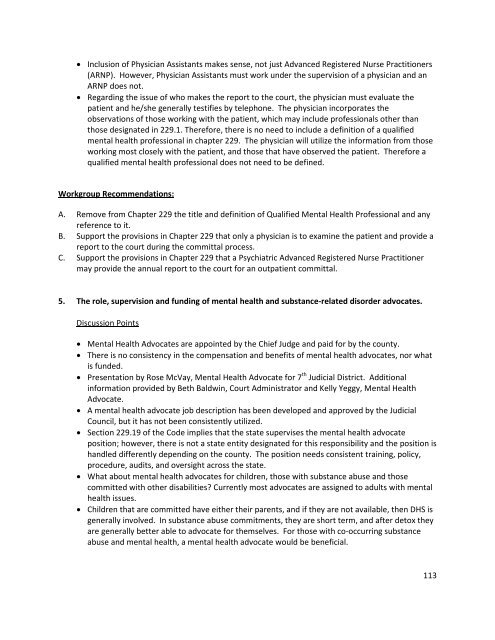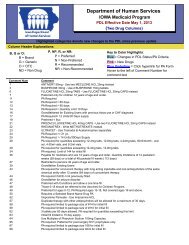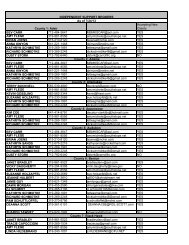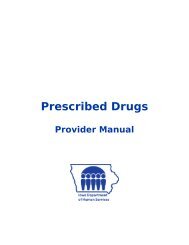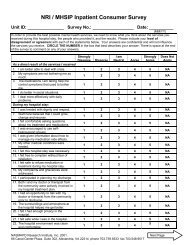Iowa Mental Health and Disability Services System Redesign Interim ...
Iowa Mental Health and Disability Services System Redesign Interim ...
Iowa Mental Health and Disability Services System Redesign Interim ...
- No tags were found...
Create successful ePaper yourself
Turn your PDF publications into a flip-book with our unique Google optimized e-Paper software.
• Inclusion of Physician Assistants makes sense, not just Advanced Registered Nurse Practitioners<br />
(ARNP). However, Physician Assistants must work under the supervision of a physician <strong>and</strong> an<br />
ARNP does not.<br />
• Regarding the issue of who makes the report to the court, the physician must evaluate the<br />
patient <strong>and</strong> he/she generally testifies by telephone. The physician incorporates the<br />
observations of those working with the patient, which may include professionals other than<br />
those designated in 229.1. Therefore, there is no need to include a definition of a qualified<br />
mental health professional in chapter 229. The physician will utilize the information from those<br />
working most closely with the patient, <strong>and</strong> those that have observed the patient. Therefore a<br />
qualified mental health professional does not need to be defined.<br />
Workgroup Recommendations:<br />
A. Remove from Chapter 229 the title <strong>and</strong> definition of Qualified <strong>Mental</strong> <strong>Health</strong> Professional <strong>and</strong> any<br />
reference to it.<br />
B. Support the provisions in Chapter 229 that only a physician is to examine the patient <strong>and</strong> provide a<br />
report to the court during the committal process.<br />
C. Support the provisions in Chapter 229 that a Psychiatric Advanced Registered Nurse Practitioner<br />
may provide the annual report to the court for an outpatient committal.<br />
5. The role, supervision <strong>and</strong> funding of mental health <strong>and</strong> substance-related disorder advocates.<br />
Discussion Points<br />
• <strong>Mental</strong> <strong>Health</strong> Advocates are appointed by the Chief Judge <strong>and</strong> paid for by the county.<br />
• There is no consistency in the compensation <strong>and</strong> benefits of mental health advocates, nor what<br />
is funded.<br />
• Presentation by Rose McVay, <strong>Mental</strong> <strong>Health</strong> Advocate for 7 th Judicial District. Additional<br />
information provided by Beth Baldwin, Court Administrator <strong>and</strong> Kelly Yeggy, <strong>Mental</strong> <strong>Health</strong><br />
Advocate.<br />
• A mental health advocate job description has been developed <strong>and</strong> approved by the Judicial<br />
Council, but it has not been consistently utilized.<br />
• Section 229.19 of the Code implies that the state supervises the mental health advocate<br />
position; however, there is not a state entity designated for this responsibility <strong>and</strong> the position is<br />
h<strong>and</strong>led differently depending on the county. The position needs consistent training, policy,<br />
procedure, audits, <strong>and</strong> oversight across the state.<br />
• What about mental health advocates for children, those with substance abuse <strong>and</strong> those<br />
committed with other disabilities Currently most advocates are assigned to adults with mental<br />
health issues.<br />
• Children that are committed have either their parents, <strong>and</strong> if they are not available, then DHS is<br />
generally involved. In substance abuse commitments, they are short term, <strong>and</strong> after detox they<br />
are generally better able to advocate for themselves. For those with co-occurring substance<br />
abuse <strong>and</strong> mental health, a mental health advocate would be beneficial.<br />
113


